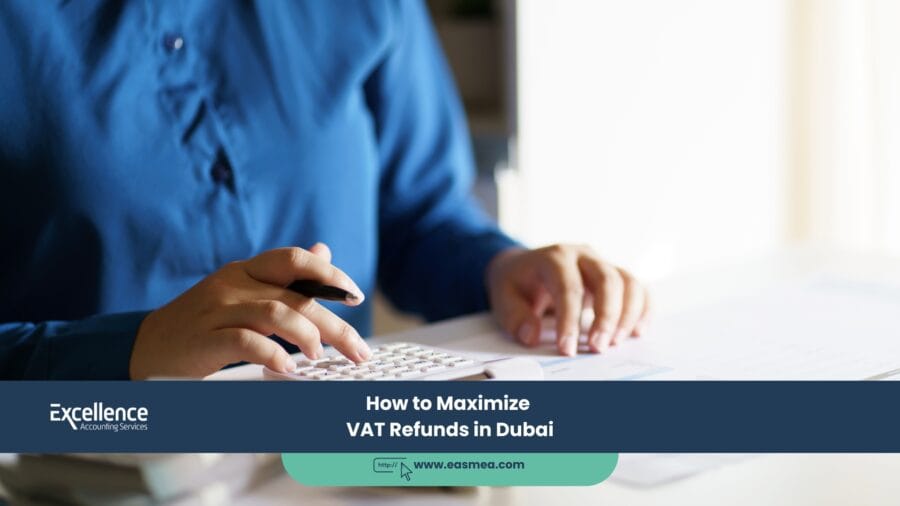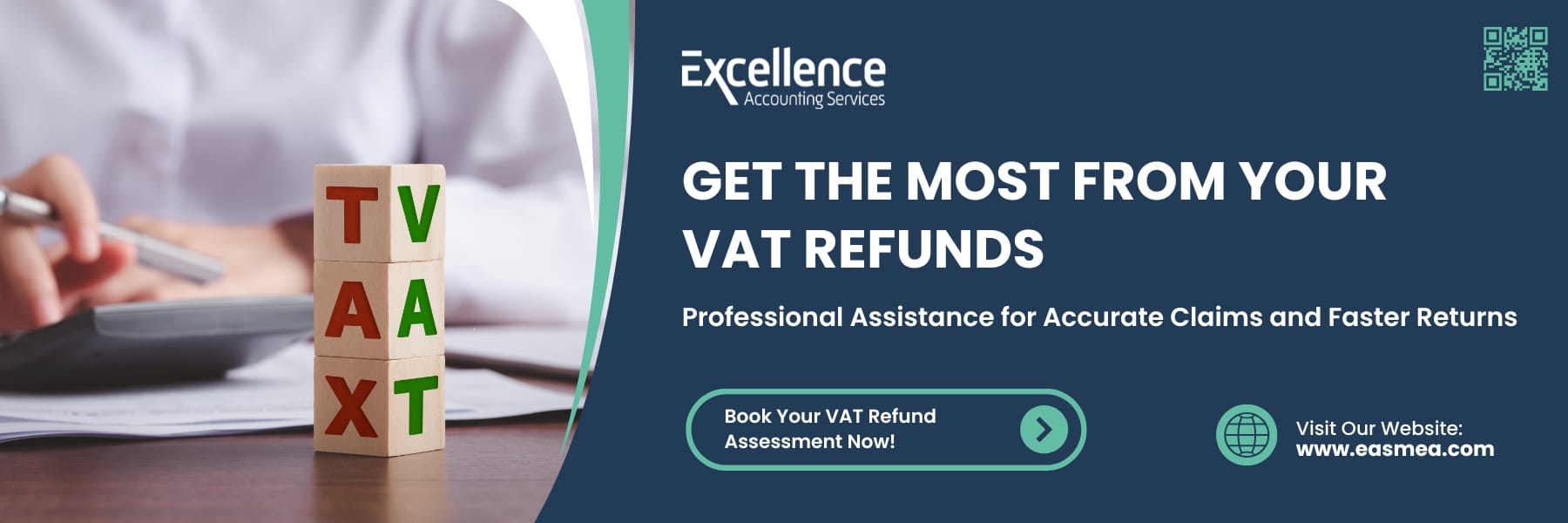Understanding VAT Refunds in Dubai
Value Added Tax (VAT) was introduced in the UAE in 2018, marking a significant shift in the region’s taxation landscape. This tax affects both businesses and individuals, with businesses required to charge VAT on goods and services. However, eligible businesses have the opportunity to recover VAT paid on expenses, provided they comply with the Federal Tax Authority (FTA) guidelines.
Recovering VAT effectively is not only a way to enhance cash flow but also a strategic tool for reducing operational costs and maintaining financial health. Understanding the intricacies of the VAT refund process—from eligibility criteria to application procedures—is essential for businesses looking to stay compliant and optimize their tax benefits.
Why Are VAT Refunds Important?
VAT refunds are a crucial aspect of financial management for businesses operating in Dubai. They offer significant advantages that directly impact a company’s cash flow, profitability, and compliance standing. Understanding the importance of VAT refunds and implementing strategies to maximize them can make a substantial difference in a business’s financial health and operational efficiency.
- Boost Cash Flow: VAT refunds ensure that businesses can recover funds spent on eligible expenses, providing a steady inflow of cash that can be reinvested into operations, expansion, or other critical needs.
- Enhance Profit Margins: By minimizing unrecoverable taxes, VAT refunds directly contribute to higher profit margins. Businesses can retain more of their earnings, making their operations more financially sustainable.
- Improve Compliance: Regularly applying for VAT refunds ensures that businesses maintain accurate financial records and adhere to the Federal Tax Authority’s (FTA) regulations. This practice not only reduces the risk of audits and penalties but also strengthens trust with regulatory bodies and stakeholders.
In summary, VAT refunds are not just a regulatory benefit but a financial tool that, when leveraged correctly, can significantly enhance a business’s operational efficiency and long-term sustainability.
Eligibility Criteria for VAT Refunds
To successfully claim a VAT refund in Dubai, your business must meet specific eligibility requirements as set by the Federal Tax Authority (FTA). Adhering to these criteria ensures a seamless refund process and compliance with regulatory standards.
Key Eligibility Requirements:
- VAT Registration:
- Your business must be registered with the FTA and possess a valid Tax Registration Number (TRN).
- Taxable Supplies:
- Only businesses that make taxable supplies, including goods and services subject to VAT, are eligible for refunds.
- Input Tax:
- VAT paid on purchases directly related to your business activities can be claimed, provided they meet the eligibility criteria.
- Proper Documentation:
- Maintain detailed invoices, receipts, and financial records that comply with FTA guidelines.
Industries with Specific Rules:
Some sectors, such as education, healthcare, and specific exempt industries, may face restrictions or unique conditions for VAT recover-ability.
VAT Refund Eligibility Overview Table:
| Criteria | Details |
|---|---|
| VAT Registration | A valid Tax Registration Number (TRN) from the FTA is mandatory for eligibility. |
| Taxable Supplies | Businesses must deal in goods/services subject to VAT, ensuring compliance with tax regulations. |
| Input Tax | Purchases directly linked to business operations, such as raw materials and operational expenses, qualify for refunds. |
| Documentation Compliance | Invoices, receipts, and other financial records must be detailed, accurate, and fully compliant with FTA standards. |
| Industry-Specific Rules | Certain sectors like healthcare and education have unique VAT recovery rules that may limit eligibility. |
This table summarizes the key criteria businesses need to meet to qualify for VAT refunds in Dubai. Ensuring compliance with these requirements streamlines the refund process and reduces the risk of rejection.
Exceptions: Certain businesses, especially those in sectors such as healthcare, education, and government services, may encounter specific restrictions or exemptions under FTA regulations. For example, while healthcare providers may be exempt from charging VAT for core services, they may still incur VAT on operational expenses, limiting the recovery of input VAT. Similarly, educational institutions might face restrictions based on the nature of services provided. Consulting a tax expert can help navigate these complexities, ensuring compliance while identifying opportunities for legitimate VAT recovery.
Step-by-Step Guide to Claiming VAT Refunds
Claiming VAT refunds in Dubai is a structured process, but careful attention to detail and timely submissions can ensure successful outcomes.
Follow these steps to maximize efficiency and compliance:
1. Prepare Accurate Documentation
- Maintain detailed records of all expenses incurred, including invoices, receipts, and contracts.
- Use automated accounting software to track VAT-related transactions and ensure accuracy.
- Verify that all documentation complies with Federal Tax Authority (FTA) standards, including supplier details, VAT amounts, and transaction dates.
2. Submit VAT Returns
- File your VAT returns through the FTA portal within the specified deadlines.
- Ensure accurate reporting of both input and output tax to reflect actual business activities.
- Double-check calculations to avoid errors that could delay the refund process.
3. Apply for Refunds
- Access the VAT refund section on the FTA portal after submitting your VAT returns.
- Complete the VAT refund application form, providing all necessary details and attaching required documentation.
- Include a clear breakdown of the VAT amount being claimed, with supporting invoices and expense records.
4. FTA Review Process
- Once submitted, the FTA will review your application to verify the accuracy and legitimacy of your claim.
- Be prepared to provide additional information or clarification if requested by the FTA.
- Ensure that your contact details are up-to-date to avoid communication delays.
5. Receive Refund
- Upon approval, the refund amount will be processed and credited to your designated bank account.
- Keep a record of the refund transaction for future reference and compliance checks.
Monitor the refund timeline, which typically takes up to 20 business days, but may vary depending on the complexity of the application.
By following these steps diligently, businesses can streamline the VAT refund process, minimize delays, and maximize financial benefits. Engaging a tax consultant can further simplify the process and ensure compliance with all regulatory requirements.
Common Challenges and How to Overcome Them
Even with proper planning, businesses in Dubai may encounter challenges during the VAT refund process. Addressing these issues promptly and effectively is critical to ensuring smooth compliance and maximizing financial benefits.
1. Incomplete Documentation
Incomplete or poorly organized documentation is one of the most common obstacles to successful VAT refunds. Missing invoices, non-compliant receipts, or insufficient records can result in delays or outright rejections of claims.
- Solution: Implement cloud-based accounting systems that automatically store and organize invoices, receipts, and financial records. Regularly audit your documentation to ensure compliance with Federal Tax Authority (FTA) standards.
- Best Practice: Train staff on FTA documentation requirements and establish a routine for record-keeping updates.
2. Errors in VAT Returns
Errors in VAT returns, whether due to miscalculations or incorrect data entries, can delay refunds and attract penalties.
- Solution: Double-check all entries before submission, using automated tools or accounting software to minimize errors. Consider hiring a tax consultant to review complex filings.
- Best Practice: Conduct regular training for your accounting team to keep them informed about the latest VAT regulations.
3. Delays in Refund Processing
Refund delays often stem from incomplete applications, lack of prompt responses to FTA queries, or high volumes of claims being processed simultaneously.
- Solution: Respond promptly to any requests for additional information from the FTA and ensure all required documents are included in the initial application.
- Best Practice: Engage a professional tax advisor to oversee the refund process and manage communications with the FTA.
4. Misinterpretation of VAT Rules
Misunderstanding VAT rules, such as eligibility for input VAT recovery, can lead to incorrect claims.
- Solution: Consult with a VAT expert to clarify ambiguities and ensure your claims align with FTA guidelines.
- Best Practice: Stay updated on any changes in VAT regulations through workshops, seminars, or official FTA announcements.
5. Industry-Specific Challenges
Certain industries, such as healthcare or education, may face unique restrictions on VAT recoverability.
- Solution: Understand the specific VAT rules applicable to your sector and tailor your claims accordingly.
- Best Practice: Work with industry-specific tax consultants who are familiar with your sector’s VAT nuances.
By identifying and addressing these challenges proactively, businesses can streamline the VAT refund process, minimize disruptions, and optimize their financial outcomes.
Pro Tips for Maximizing VAT Refunds
Maximizing VAT refunds requires a proactive and strategic approach to financial management and compliance. Here are some advanced tips to help your business make the most of its VAT recovery potential:
- Invest in Advanced Accounting Software:
- Leverage cloud-based accounting tools that automate VAT calculations, track input and output tax, and generate compliant invoices. These tools reduce errors and ensure that all VAT transactions are accurately recorded and categorized.
- Conduct Regular Internal Audits:
- Schedule periodic audits to identify discrepancies, missing invoices, or non-compliant transactions. Regular reviews help address issues before submitting VAT returns and ensure a smooth refund process.
- Engage Specialized Tax Advisors:
- Work with professionals who have in-depth knowledge of Dubai’s VAT regulations. They can help navigate complex cases, optimize your VAT claims, and ensure compliance with Federal Tax Authority (FTA) requirements.
- Maintain Comprehensive Documentation:
- Keep all invoices, receipts, contracts, and financial records meticulously organized. Use digital storage solutions for easy access and ensure that every document meets FTA standards.
- Stay Updated on VAT Regulations:
- Tax laws and regulations can change frequently. Subscribe to updates from the FTA, attend industry workshops, and ensure your team is trained on the latest compliance requirements.
- Focus on Sector-Specific Opportunities:
- Certain industries, such as exports or free-zone operations, may have additional VAT benefits. Understanding these nuances can help you maximize refunds specific to your business sector.
- Claim VAT on Overlooked Expenses:
- Review all business-related expenses, such as utilities, transportation, and maintenance costs, to ensure you are claiming VAT on all eligible items. Small expenses can add up significantly over time.
- Avoid Common Errors in VAT Returns:
- Double-check every VAT return before submission to avoid calculation errors or omissions. Automated software can help flag inconsistencies and ensure accuracy.
- Respond Promptly to FTA Queries:
- If the FTA requests additional information, provide clear and comprehensive responses quickly. Delayed responses can slow down the refund process or result in rejections.
- Plan for Timely Submissions:
- Ensure VAT returns and refund applications are submitted well before deadlines. Timely submissions demonstrate compliance and reduce the risk of penalties or processing delays.
By adopting these strategies, businesses can streamline the VAT refund process, minimize errors, and maximize financial returns. A proactive approach not only enhances operational efficiency but also strengthens your organization’s compliance framework.
Frequently Asked Questions (FAQs)
VAT refunds are available to businesses registered with the Federal Tax Authority (FTA) that engage in taxable supplies, including goods and services subject to VAT. Eligibility is not limited to direct sales; businesses paying VAT on operational and business-related purchases such as office supplies, rental fees, and utilities can also claim refunds.
However, ensuring that all documentation complies with FTA standards is crucial. This includes maintaining detailed, accurate invoices, receipts, and financial records that clearly specify VAT amounts and transaction details. Proper documentation not only facilitates a smooth refund process but also minimizes the risk of application rejections and penalties.
Expenses eligible for VAT refunds include various business-related costs such as office supplies, rental fees, utilities, employee travel expenses, and equipment purchases that are directly tied to the company’s operations. These costs must be supported by VAT-compliant invoices and meet the criteria set by the Federal Tax Authority (FTA).
However, some items, such as entertainment expenses, fines, and non-business-related purchases, may not qualify for VAT recovery. To avoid complications, businesses should regularly review the FTA guidelines, ensure all documentation is accurate, and consult a tax advisor for clarity on claimable expenses.
After submitting the refund application, the Federal Tax Authority (FTA) typically processes it within 20 business days. However, delays can occur due to several factors, such as incomplete documentation, errors in the application, or the need for additional verification.
It is crucial to ensure that all required information is submitted accurately and promptly to avoid processing delays. Businesses should maintain open communication with the FTA and respond quickly to any requests for clarification or additional documents. Engaging a tax advisor can further help streamline the process and reduce the likelihood of delays.
If your VAT refund application is rejected, it’s essential to act quickly to address the reasons for rejection and rectify any errors. Begin by reviewing the feedback provided by the Federal Tax Authority (FTA). Common reasons for rejection include incomplete documentation, incorrect calculations, or non-compliance with VAT regulations. Once the issues are identified, take the following steps:
- Correct the Errors: Ensure all missing or incorrect documents are updated and comply with FTA guidelines. Double-check calculations and ensure accuracy.
- Seek Professional Advice: Engage a tax advisor to review your case and provide guidance on the best course of action to rectify the issues.
- Resubmit the Application: Prepare a new application with all required corrections and supporting documentation. Clearly address the rejection reasons in the resubmission.
- File an Appeal if Necessary: If you believe the rejection was unjustified, you can file an appeal through the FTA. Ensure your appeal includes strong evidence and detailed explanations to support your claim.
Being proactive and thorough in addressing rejection reasons can help recover your VAT refund and build trust with the FTA for future submissions.
Yes, tourists can claim VAT refunds on eligible purchases through designated refund outlets. The process requires presenting a valid passport and VAT-compliant invoices for purchases made from registered retailers participating in the tourist refund scheme.
These outlets often use digital systems to simplify and expedite the refund process. Tourists must ensure that their purchases meet eligibility criteria, such as being unused and exported within 90 days of purchase. Refunds can be claimed at designated airport counters or through authorized refund agencies before departing the UAE, providing an added financial benefit for visitors.
Yes, inaccurate submissions can lead to significant fines and potentially delay the VAT refund process. Common errors include incorrect VAT calculations, mismatched figures, or incomplete supporting documentation. To avoid these issues, ensure all entries are thoroughly reviewed before submission.
Utilizing automated accounting tools can help detect discrepancies, while consulting a tax professional provides expert oversight to ensure compliance with Federal Tax Authority (FTA) regulations. Proactive measures not only minimize the risk of fines but also enhance the accuracy and efficiency of the refund application process.
Yes, VAT refunds can be claimed retroactively for expenses incurred within the stipulated timeframe, typically up to five years, as per Federal Tax Authority (FTA) regulations. To ensure a successful retroactive claim, maintain detailed records of all relevant transactions, including VAT-compliant invoices, receipts, and financial statements.
Regular audits of past expenses and consulting with a tax advisor can help identify claimable amounts and streamline the refund process. Proper documentation and accurate filing are essential to avoid delays or rejections of retroactive claims.
Refund claims must be made within a specific period, typically during the VAT return filing cycle, which is set by the Federal Tax Authority (FTA). Submitting claims within this timeframe is essential to ensure eligibility and avoid automatic rejection.
Businesses should maintain a clear schedule of VAT return deadlines and implement robust systems for tracking expenses and claimable VAT. Late submissions may not only be rejected but could also trigger compliance reviews or audits, emphasizing the importance of timely and accurate filing. Proactively consulting with a tax advisor can further help ensure all claims are submitted within the required period and meet regulatory standards.
Yes, small businesses registered for VAT can claim refunds on eligible expenses, including those incurred in day-to-day operations like utilities, office supplies, and equipment purchases. Voluntary registration is also an option for smaller entities below the mandatory threshold of AED 375,000 in annual taxable revenue.
This allows them to claim input VAT on business expenses, enhancing cash flow and financial flexibility. Opting for voluntary registration also signals professionalism to clients and partners, demonstrating preparedness for future growth. It is advisable for small businesses to consult with a tax expert to understand the benefits and obligations associated with VAT registration and refunds.
Tools like cloud-based accounting software and automated VAT calculators are invaluable for businesses seeking to streamline their VAT refund process. These tools not only simplify record-keeping by organizing invoices, receipts, and financial transactions but also enhance accuracy by automating complex VAT calculations.
Additionally, they expedite refund processes by ensuring compliance with Federal Tax Authority (FTA) standards and reducing the risk of errors or omissions in applications. Investing in such technologies allows businesses to focus on growth while maintaining seamless tax compliance.





